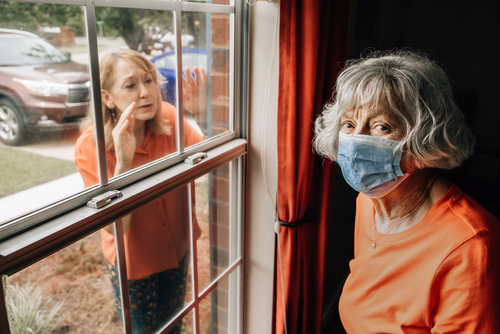Due to necessary isolation during the Coronavirus pandemic, there has been an excess in deaths among dementia patients during COVID lockdowns.
The tactic of isolation in long term care facilities, meant to protect the vulnerable elderly during the coronavirus pandemic, has caused an increase of deaths among Alzheimer’s and other dementia patients, says a recent article in the Washington post. According to the article, among the tens of thousands of excess deaths recorded since COVID-19 hit America—deaths not directly the result of the virus—over 13,000 more deaths than in previous years occurred among Alzheimer’s and other dementia patients since March of 2020. Excess deaths of dementia patients totaled more than those of diabetes and heart disease (the next two highest categories of excess deaths) combined. While experts say that many of these excess deaths might be the result of undiagnosed COVID, they suggest others have resulted as indirect consequences of the pandemic, such as facilities being overwhelmed and caregivers’ attention being spread thin.
Over the last few months of the pandemic, says the Washington Post, doctors have reported an increase of the following issues and incidents among previously stable dementia patients:
- Marked Frailty and Falls—With the decrease of activity during nursing home isolation, patients remain immobile for long periods, which contributes to muscular atrophy. Serious deterioration decreases a patient’s ability to recover from a fall, so that a fall leads quickly from hospitalization to pneumonia and death.
- Pulmonary Infections—Advanced dementia patients suffer from a pronounced inability to swallow, and improper swallowing of food can lead to lung infections that are difficult to recover from.
- Depression—Cut off from activities and interaction with loved ones, dementia patients are robbed of mental and social stimulation. This not only quickens the advancement of their condition but also brings on what can be severe depression, often accompanied by such dangerous side effects as extreme weight loss.
The isolation of dementia patients from family members has an impact that cannot be overstated, says the article. Beyond providing essential social and mental stimulation, proven to help slow the advancement of the disease, family members often fill gaps in care left by nursing homes, such as feeding or bathing. Being cut off from loved ones, then, has been especially hard on dementia patients. And while other countries, such as the Netherlands, have safely eliminated lockdowns without promoting an increase of COVID cases, U.S. homes have yet to acquire the testing, protective equipment, and rigorous protocols to do the same.
An excess in deaths among dementia patients during COVID lockdowns has continued even has American leaders rush to advance re-openings elsewhere in the country. The focus is on combating mask mandates and reopening restaurants, bars, and hair salons. Meanwhile, dementia patients are crippled by forced isolation, and nursing homes in some cases are still waiting for adequate testing, PPE, help, and financial assistance to combat the pandemic. While only a small percentage of Americans reside in nursing homes, about 40 percent of U.S. coronavirus deaths have occurred there.
Fighting for Your Loved One during Trying Times
The impact of the coronavirus pandemic on Pennsylvania and New Jersey nursing homes makes it important now more than ever to ensure the well-being and safety of your loved one. Nursing homes in Philadelphia/PA or NJ are required to meet specific health and safety requirements and to provide such care as to secure the physical, mental, and psycho/social well-being of their residents. Falls and injuries that occur in PA or NJ nursing homes often are an indication of nursing home neglect. If the safety or quality of care of a Pennsylvania or New Jersey nursing home during COVID-19 raises your concern, or if you suspect neglect, abuse, or fraud has occurred at the Pennsylvania, Philadelphia, or New Jersey nursing home where your loved one lives, please contact nursing home abuse attorney Brian P. Murphy to discover your legal rights and options.







